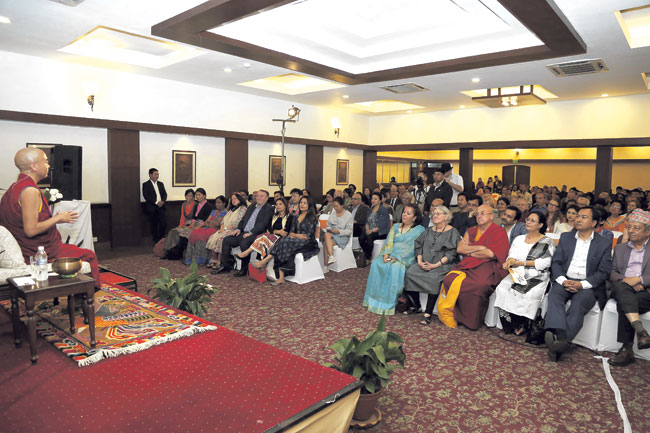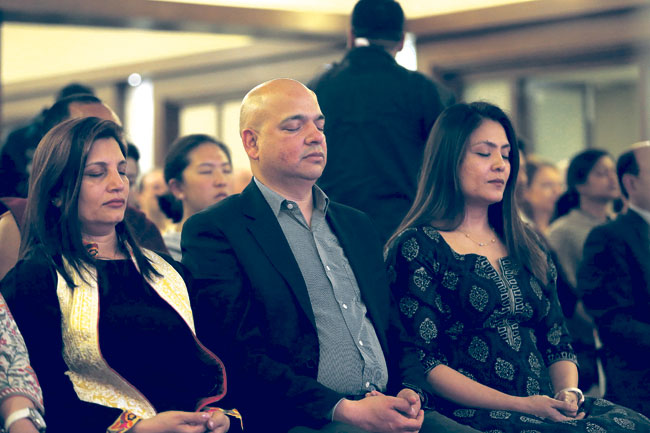It was an evening like no other. It was a talk like no other. And it was an invitation to do something that most of the 'modern' men and women would have no time to do.
In a packed room of Hotel Annapurna in Kathmandu, business leaders, senior executives, expats, diplomats, and professionals from many different fields – about 300 of them – listened in rapt attention to what one maroon-clad man in his early 40's had to say.
There was something extraordinary about it.
Many in the audience would otherwise be so busy in their own worlds that having 10 minutes off their daily schedules would be a real trouble. And yet they could manage to be there to find out what this Buddhist monk would say for two hours.
In the event entitled "An Evening with the Happiest Brain", noted meditation master Yongey Mingyur Rinpoche talked about ways of physical and mental well being.
 Mingyur Rinpoche is the author of bestselling books in meditation, including ‘The Joy of Living: Unlocking the Secret and Science of Happiness’. He garnered international fame when he allowed the scientists of University of Wisconsin – Madison, including the famous neuroscientist Richard Davidson, to scan his brain and do other tests during meditation. The scientists were startled to find in one research on compassion that his results exceeded by several hundred times than the average results.
Mingyur Rinpoche is the author of bestselling books in meditation, including ‘The Joy of Living: Unlocking the Secret and Science of Happiness’. He garnered international fame when he allowed the scientists of University of Wisconsin – Madison, including the famous neuroscientist Richard Davidson, to scan his brain and do other tests during meditation. The scientists were startled to find in one research on compassion that his results exceeded by several hundred times than the average results.
Mentioning a research on Rinpoche's brain, genetic scientist-turned-Buddhist-monk and celebrated author of various books on meditation, Matthieu Ricard, said: "In a recent research by Richard Davidson, the change in density of grey matter and metabolism of brain that indicate ageing of the brain, was found significantly low in case of Rinpoche. This was a study carried over the past 14 years. The graph showing Rinpoche's ageing process was almost flat."
Buy 1, get 2 free
"Meditation helps our mind, develops creativity and productivity, and makes our mind calm and peaceful," Rinpoche said. "It helps us see our true potential."
"But apart from the mind, meditation is also good for the physical body. Many researches have shown that meditation helps the body deal with different diseases," he said."Meditation helps us to have happy mind and healthy body, and it is good for our life."
Simaltal bus accident: Families return, five bodies remain unid...

The audience could not help chuckle when Rinpoche added: "Through meditation, you will buy 1, get 2 free."
Awareness, the essence of meditation
So what exactly is meditation?
"The essence of meditation is awareness. It is with us all the time. Whether you realize it or not, it is there," Rinpoche said.
"Awareness means knowing about what you are thinking, feeling, or doing. Whatever ideas come to your mind, just knowing that is awareness. It's that easy," he said.
Rinpoche conducted four simple mediations – using sound, bodily sensations, mantra, and breath – and advised the audience to choose whichever felt best to them. His advice was not to be fixated to any method but to use it wisely as a means to develop awareness.
 "Awareness is always free. It is like space. Happiness or unhappiness cannot change awareness. Can you change space?" Rinpoche said. "Thought, emotion and perception are like weathers in the space. You know pollution cannot change the nature of space. You cannot block space.
"Awareness is always free. It is like space. Happiness or unhappiness cannot change awareness. Can you change space?" Rinpoche said. "Thought, emotion and perception are like weathers in the space. You know pollution cannot change the nature of space. You cannot block space.
Awareness is always present and it is always pure. You just need to connect with your own awareness. "
"Be yourself, feel free, and whatever comes, let it be with awareness," he advised aspiring meditators.
Finding your own diamond
"Awareness is our basic innate goodness. We all have wonderful nature, our basic nature is awesome. But normally we do not know. The key thing is recognition," Rinpoche said.
"Imagine you have a big diamond of 10 kilos at home, but you don't recognize it. And you are begging for food," he said. "That's the same with awareness. Within us, we have this diamond. But unfortunately, we are not aware of this diamond – our basic goodness. As we do not recognize, it does not benefit us."
"Using a step-by-step method to develop awareness, you recognize your inner diamond."
No blocking of thought, no striving for concentration
Rinpoche made it clear to the audience that trying to block a thought or develop concentration would not be helpful for meditation. In his unique style of simplicity, he conducted a trial meditation to block the mind of a particular thought. The audience couldn't help laugh when he invited them to meditate without allowing the thought of DaalBhaat (lentil soup and rice, a major meal of Nepal) come to the mind. As expected, nobody was successful.
"Being in meditation does not mean restricting thoughts or emotions. You don't strive to be thoughtless," Rinpoche explained. "Thoughts may be there, you just be aware of them."
"If you look to develop concentration, it may say – I am busy now, you need to make appointment first," Rinpoche said in his humor-filled way. "Just be aware of things in meditation as they are, and concentration may say – I am free now, I will come join you."
"If you look for concentration, it will go away. But if you don't care about it, it will come," he added.
Happiness or not, both signs of progress
"Sometimes, you feel happy in meditation and your mind becomes very settled. The next day, your mind becomes disturbed and you become unhappy again. You feel that thoughts have increased. That does not mean you are doing bad. In fact you are making progress," Rinpoche said.
"You can compare it with milk tea. You grind green cardamom and put it to bring flavor in tea. You don't see the cardamom dust in tea. But if you put it in clean water, it becomes very visible.
Likewise, if you feel thoughts have increased in your mind, it means you have started noticing things more clearly."
More than a 'feel good' experience
One of the key features of Rinpoche's teachings was his ability to present the topic of meditation in a simple manner, and help people understand the depth behind the simplicity.
"Meditation is so useful for us all. We read about it, watch shows about it, but do not bother about practicing it," said Dr Kapil Dev Upadhyaya, senior psychiatrist and chairperson of Center for Mental Health and Counselling-Nepal. "With Rinpoche's clear and easy instructions, I hope many can understand its importance and benefit by practicing."
"As we heard from Matthieu, modern scientific research shows that meditation slows down ageing process. It is an amazing thing to know," he added. "Experiments on Rinpoche have proved it, and it inspires people."
One of the high-profile members in the audience was Brazilian Ambassador to Nepal, Maria Teresa Mesquita Pessôa.
Sharing her experience of the evening, the ambassador said: "I really enjoyed the skillfulness employed by Rinpoche in guiding us through various methods of meditation. He is uniquely suited to translate ancient wisdom into a language that contemporary practitioners understand and relate to."
For her, practicing meditation held much more meaning than just feeling good.
"The practice of meditation in Buddhism is one of the six Pramitas (perfections) to be developed and practiced as a means to attain wisdom and liberation," Pessôa said. "I believe it should be practiced in that context and not just to feel good."


































